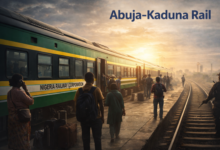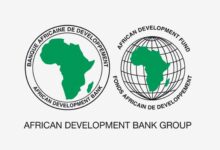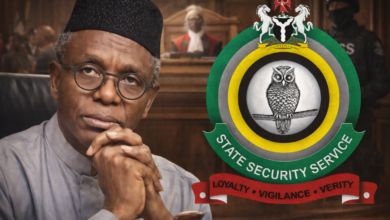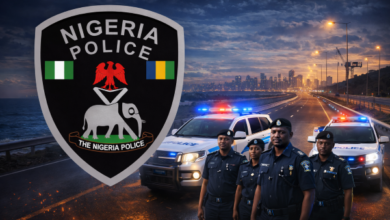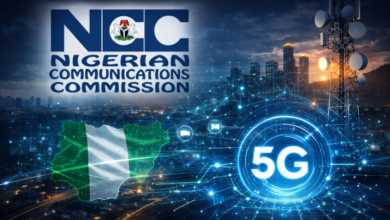
In a dramatic twist to one of Nigeria’s most high-profile trials, Nnamdi Kanu, leader of the proscribed Indigenous People of Biafra (IPOB), has dismissed his entire legal team and declared his intention to personally defend himself before the Federal High Court in Abuja.
At Thursday’s resumed hearing before Justice James Omotosho, Kanu stunned the courtroom by announcing that he no longer wished to be represented by Chief Kanu Agabi, SAN, a former Attorney-General of the Federation, and his team of Senior Advocates. The development led the lawyers to formally withdraw their appearance from the case.
This bold move adds yet another layer to Kanu’s long-running trial, which has traversed multiple courts and raised complex constitutional, jurisdictional, and human rights questions about the boundaries of national security, fair trial, and the rule of law in Nigeria.
A Lone Defence: Kanu’s Bid to Challenge Jurisdiction
Following the exit of his legal team, Nnamdi Kanu immediately took the floor from the dock, asserting that the Federal High Court lacks jurisdiction to try him under the current charges filed by the Federal Government.
He told the court he was “ready to conduct his own defence,” and insisted that the proceedings were fundamentally defective.
This challenge aligns with Kanu’s motion on notice, personally signed and filed on October 21, 2025, titled:
“Notice of Number and Names of Witnesses to be Called by the Defendant and Request for Witness Summons/Subpoena and the Variation of the Time Within Which to Defend the Counts/Charges Against the Defendant.”
The motion, which lists 23 witnesses, indicates Kanu’s strategy to frame his defence not just on the facts of his prosecution but on what he describes as “the political context” of his statements and actions.
Among his proposed “compellable witnesses” are some of Nigeria’s most prominent political and security figures, including:
- Abubakar Malami, former Attorney-General of the Federation
- Gen. Theophilus Danjuma (rtd), former Minister of Defence
- Gen. Tukur Buratai (rtd), former Chief of Army Staff
- Nyesom Wike, Minister of the Federal Capital Territory
- Dave Umahi, Minister of Works
- Governors Babajide Sanwo-Olu (Lagos) and Hope Uzodinma (Imo)
- Okezie Ikpeazu, former Governor of Abia State
- Ahmed Abubakar, immediate past DG of the National Intelligence Agency (NIA)
- Yusuf Bichi, former Director-General of the Department of State Services (DSS)
Kanu also promised to submit sworn witness statements and to “notify the prosecution within a reasonable time,” emphasizing that his decision was not a delay tactic but a quest to ensure justice is visibly done.
Legal Implications: A Battle Over Fair Trial and Jurisdiction
Legal experts say Kanu’s latest move signals a shift from procedural defence to constitutional contestation, as he seeks to question the authority of the court and the legitimacy of the charges against him.
His decision to represent himself, while unusual, is permitted under Nigeria’s criminal procedure law — provided the defendant demonstrates sufficient understanding of the proceedings.
“The challenge to jurisdiction is a fundamental issue,” said a senior Abuja-based legal analyst. “If the court lacks jurisdiction, every subsequent action becomes null and void, no matter how far the trial has gone.”
Observers note that the IPOB leader’s insistence on self-representation could either expose procedural gaps in the prosecution or prolong an already contentious case that has spanned nearly a decade.
A Trial Steeped in Politics and Precedent
Since his re-arrest and repatriation from Kenya in 2021, Nnamdi Kanu’s trial has oscillated between accusations of terrorism, treasonable felony, and incitement.
The case has become a touchstone for constitutional rights, balancing the government’s duty to preserve national security against the accused’s right to free speech and fair hearing.
Kanu’s decision to call current and former senior government officials as witnesses may open a new chapter in the trial — one that tests not only the limits of judicial transparency, but also the extent to which executive decisions can be scrutinized in open court.
Legal commentators suggest that Kanu’s defence strategy appears designed to shift the narrative from criminal culpability to political accountability — effectively positioning himself as both defendant and whistleblower in Nigeria’s evolving democratic story.
What Happens Next
Justice Omotosho has adjourned the case to October 24, 2025, for continuation of hearing, during which Kanu is expected to formally present his witness list and jurisdictional arguments.
Court observers anticipate that the hearing could determine whether the matter proceeds to full trial or faces another legal reset.
Meanwhile, the Department of State Services (DSS) continues to hold Nnamdi Kanu in custody, following a court-ordered remand pending determination of his charges. His last court appearance also followed a private consultation session with his former legal team, as directed by the court.
BRANDECONOMY Legal Insight
Nnamdi Kanu’s courtroom manoeuvre underscores the fragile intersection of law, politics, and public perception in Nigeria’s justice system. His self-defence decision represents a high-risk but high-impact strategy, intended to test both judicial independence and prosecutorial limits.
From a broader lens, the case reflects Nigeria’s ongoing struggle to balance national cohesion with civil liberties — a theme that continues to shape the country’s democratic narrative, its human rights posture, and its global reputation.
As the case unfolds, one thing remains clear: beyond the legal theatrics lies a fundamental question about the integrity of justice in politically charged trials.


